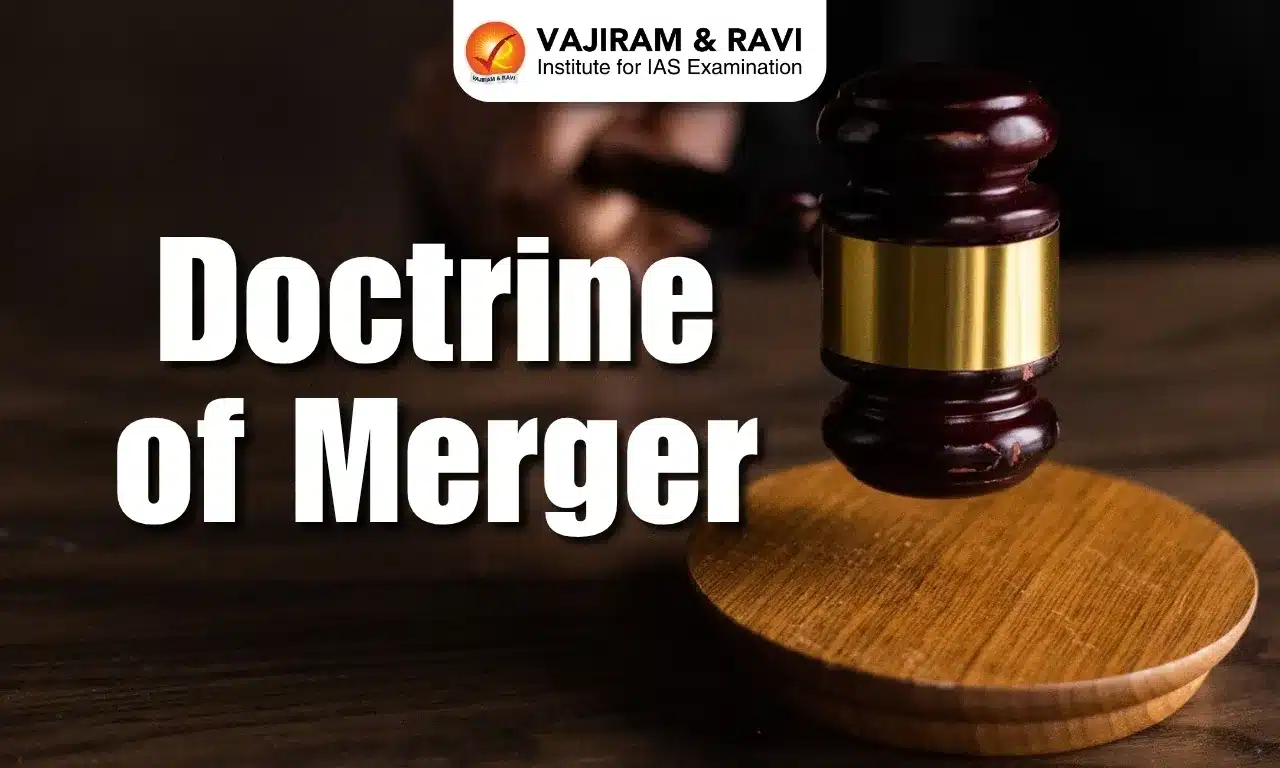Doctrine of Merger Latest News
In a judgment clarifying the limits of the doctrine of merger, the Supreme Court of India recently observed that the doctrine of merger is not a doctrine of rigid and universal application.
About Doctrine of Merger
- It is a common law doctrine founded on the principle of maintenance of decorum and propriety in the functioning of Courts and Tribunals and preserving the sanctity of the justice delivery system.
- The underlying logic being that there cannot be more than one decree or operative order governing the same subject matter at a given point of time.
- It provides that when an appellate court passes an order, the order passed by the lower court is merged with that order.
- The doctrine is not recognized statutorily but is a statement of judicial propriety and seeks to instill discipline in the functioning of subordinate adjudicating authorities, whether judicial, quasi-judicial, or administrative.
- The applicability of the doctrine of merger entails the existence of a decision of a subordinate court/forum against which a right of appeal/revision before a superior forum/authority exists, which has been exercised and which has either modified, reversed or affirmed the decision of the subordinate authority.
- The consequence of such an act would be that the decision of the subordinate authority shall merge with that of the superior forum, which only shall sustain, be operative and capable of being enforced.
- The essence of the doctrine of merger is that it is only the decisions of the appellate, revisional, or higher authority that subsist, and the order under challenge ceases to have an independent existence.
- The doctrine solves the issue of which order must be enforced and given importance if there are multiple orders passed by both subordinate and superior courts on a single issue.
- It is not a doctrine of universal or unlimited application. It will depend on the nature of the jurisdiction exercised by the superior forum and the content or subject matter of the challenge.
Source: LB
Last updated on November, 2025
→ Check out the latest UPSC Syllabus 2026 here.
→ Join Vajiram & Ravi’s Interview Guidance Programme for expert help to crack your final UPSC stage.
→ UPSC Mains Result 2025 is now out.
→ UPSC Notification 2026 is scheduled to be released on January 14, 2026.
→ UPSC Calendar 2026 is released on 15th May, 2025.
→ The UPSC Vacancy 2025 were released 1129, out of which 979 were for UPSC CSE and remaining 150 are for UPSC IFoS.
→ UPSC Prelims 2026 will be conducted on 24th May, 2026 & UPSC Mains 2026 will be conducted on 21st August 2026.
→ The UPSC Selection Process is of 3 stages-Prelims, Mains and Interview.
→ UPSC Result 2024 is released with latest UPSC Marksheet 2024. Check Now!
→ UPSC Prelims Result 2025 is out now for the CSE held on 25 May 2025.
→ UPSC Toppers List 2024 is released now. Shakti Dubey is UPSC AIR 1 2024 Topper.
→ UPSC Prelims Question Paper 2025 and Unofficial Prelims Answer Key 2025 are available now.
→ UPSC Mains Question Paper 2025 is out for Essay, GS 1, 2, 3 & GS 4.
→ UPSC Mains Indian Language Question Paper 2025 is now out.
→ UPSC Mains Optional Question Paper 2025 is now out.
→ Also check Best IAS Coaching in Delhi
Doctrine of Merger FAQs
Q1. The Doctrine of Merger is primarily related to which field?+
Q2. What is the legal effect of the Doctrine of Merger?+
Q3. Is the Doctrine of Merger universally applicable in all cases?+
Tags: doctrine of merger

















